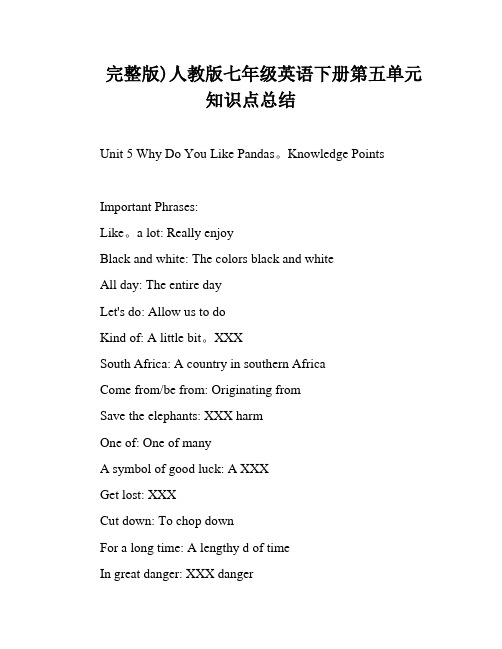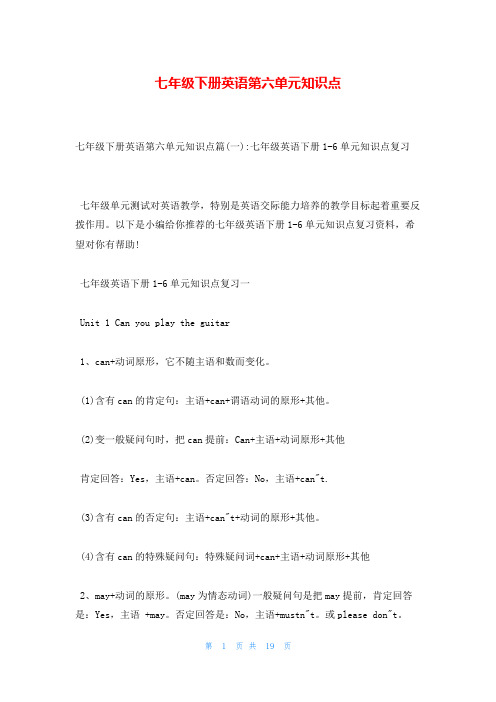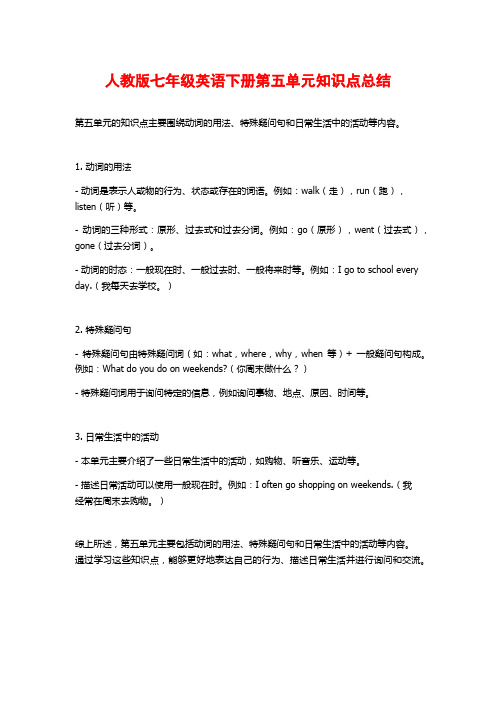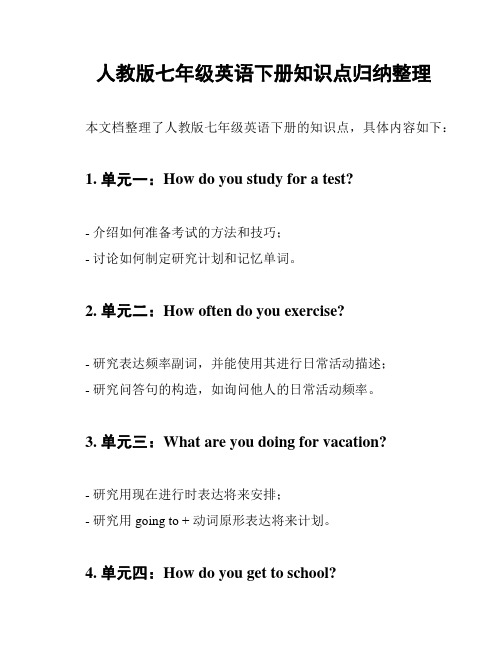人教版七年级英语下第五、六单元知识重点
完整版)人教版七年级英语下册第五单元知识点总结

完整版)人教版七年级英语下册第五单元知识点总结Unit 5 Why Do You Like Pandas。
Knowledge PointsImportant Phrases:Like。
a lot: Really enjoyBlack and white: The colors black and whiteAll day: The entire dayLet's do: Allow us to doKind of: A little bit。
XXXSouth Africa: A country in southern AfricaCome from/be from: Originating fromSave the elephants: XXX harmOne of: One of manyA symbol of good luck: A XXXGet lost: XXXCut down: To chop downFor a long time: A lengthy d of timeIn great danger: XXX dangerXXX ivory: XXXPlaces with food and water: XXX sustenanceKill。
for: To take the life of an animal for a specific purpose1.Seeing Pandas: Observing pandas2.My Favorite Animals: XXX XXX3.e to SP: Greetings to SP4.e Back to SP: Greetings to SP upon returning5.From: Originating from6.In the Zoo: Located in a zoo7.On the Farm: Located on a farm8.My New Pet: XXX9.XXX: Bipedal movement10.Kind of: XXX11.Kind of Interesting: XXX12.A XXX: XXX13.A Little Boring: XXX14.A Kind of: A type of15.All Kinds of: Many different types of16.All Day: The entire day17.A Good Name for XXX: A fitting name for a person18.South Africa: A country in southern Africa19.South China: The southern n of China20.South America: The southern n of the Americas21.America。
七年级下册英语第六单元知识点

七年级下册英语第六单元知识点七年级下册英语第六单元知识点篇(一):七年级英语下册1-6单元知识点复习七年级单元测试对英语教学,特别是英语交际能力培养的教学目标起着重要反拨作用。
以下是小编给你推荐的七年级英语下册1-6单元知识点复习资料,希望对你有帮助!七年级英语下册1-6单元知识点复习一Unit 1 Can you play the guitar1、can+动词原形,它不随主语和数而变化。
(1)含有can的肯定句:主语+can+谓语动词的原形+其他。
(2)变一般疑问句时,把can提前:Can+主语+动词原形+其他肯定回答:Yes,主语+can。
否定回答:No,主语+can"t.(3)含有can的否定句:主语+can"t+动词的原形+其他。
(4)含有can的特殊疑问句:特殊疑问词+can+主语+动词原形+其他2、may+动词的原形。
(may为情态动词)一般疑问句是把may提前,肯定回答是:Yes,主语 +may。
否定回答是:No,主语+mustn"t。
或please don"t。
join+某个组织,俱乐部,party,参军,党派等“加入”Join sb. “参加到某人中” join in (doing)sth “加入做......,参加某个活动” Join in=take part in +活动,比赛3、说某种语言:speak+语言4、play+球、棋、牌;play+the+乐器。
5、擅长于(做)什么:be good at +名词/动ing6、帮助某人做某事:help sb. (to ) do sth. help sb. with sth.7、我能知道你名字吗May I know your name8、想要做什么:want to do sth 例如:I want to learn about art.9、What club do you want to joinI want to join the chess club and the basketball club.10、What club does Tom want to join He wants to join the swimming club .11、He can’t play the violin or the piano. Can you help kids with swimming12、Why do you want to join the English club Because I want to learn English well.Unit 2 What time do you go to school1、what time和when引导的特殊疑问句。
(完整版)人教版七年级英语下册第五单元知识点总结

人教版七年级下册英语第五单元Unit5 Why do you like pandas? 知识要点重要短语like…a lot 非常喜欢… black and white 黑白相间 all day整天Let’s do= let us do 让我们做……kind of 有点儿,稍微 South Africa南非be from/come from 来自于save the elephants救助大象one of…其中之一a symbol of good luck好运的象征 get lost迷路 cut down 砍倒for a long time 很长时间in great danger处于(极大)危险之中things be made of ivory由象牙制成的东西 places with food and water有食物和水的地方kill……for……为……杀1.see the pandas 看熊猫2.my favorite animals我最喜欢的动物3.welcome to sp 欢迎来某地4.welcome back to sp 欢迎回到某地5.be from 来自e from来自7.in the zoo 在动物园里8.on the farm 在农场里9.my new pet 我的新宠物10.walk on two legs 用两条腿走11.kind of有点12.kind of interesting有点有趣13.a little有点14.a little boring有点无聊15.a kind of一种16.all kinds of 各种各样的17.all day整天18.a good name for sb对某人是一个好名字19.South Africa南非20.South China华南21.South America南美洲22.America, the USA美国23.the UK ,England英国24.the South Pole南极25.what animals什么动物26.save the elephants挽救大象27.one of +n复数。
人教版七年级英语各单元知识点

人教版七年级英语各单元知识点Unit 1 My name's Gina.一、重点单词。
1. name:名字,可数名词。
例如:My name is Tom.2. nice:令人愉快的;宜人的。
如:Nice to meet you.(很高兴见到你。
)3. to:常用于动词原形前,表示目的或意图,也可用于一些固定搭配中,如Nice to meet you.4. meet:遇见;相逢。
5. too:也;又;太。
例如:I'm fine, too.(我也很好。
)6. your:你的;你们的,形容词性物主代词,后面需接名词,如your name(你的名字)。
7. his:他的,形容词性物主代词,如his book(他的书)。
8. her:她的,形容词性物主代词,例如her pen(她的钢笔)。
二、重点短语。
1. my name:我的名字。
2. your name:你的名字。
3. first name:名字(在英语中,名字在前,姓氏在后,first name就是指个人的名字)4. last name:姓氏(也可表达为family name)5. nice to meet you:很高兴见到你(回答常用Nice to meet you, too.)三、重点句型。
1. —What's your name?(你叫什么名字?)—My name's Gina.(我的名字是吉娜。
)2. —Nice to meet you.(很高兴见到你。
)—Nice to meet you, too.(我也很高兴见到你。
)3. —What's his name?(他叫什么名字?)—His name's Tom.(他的名字是汤姆。
)4. —What's her name?(她叫什么名字?)—Her name's Mary.(她的名字是玛丽。
)Unit 2 This is my sister.一、重点单词。
七年级下册人教版第六单元英语知识点

人教版英语七年级下册第六单元知识点如下:单词:1.看电视/电影 watch TV/ watch a movie2.看报纸 read a newspaper3.通过电话交谈 talk on the phone4.听音乐 listen to music5.使用电脑 use the computer6.做汤 make soup7.洗餐具 wash the dishes8.有点儿 kind of9.去电影院 go to the movies10.电视节目 TV show11.在六点钟 at six o’clock12.等待 sb/ sth Wait for sb/ sth13.那听起来不错 That sounds good14.电视新闻 TV news15.在周末 on the weekend16.购物中心 shopping center17.举起,抬起 lift up18.倒掉,倾倒 pour out19.报警 call the police20.报警电话 the police phone number21.消防电话 the fire phone number22.帮助,救援 help, rescue23.伤,受伤 hurt24.丢失,失落 lost25.迷路,迷失 lost way26.希望希望 hope to do sth/ hope that+句子27.想要,需要 want to do sth/ need sth28.谢谢你的帮助 Thank you for your help29.在乡下 in the countryside30.野餐 have a picnic31.湖,湖泊 lake32.在湖边 on the lake33.山,山峦 mountain34.在山顶 on the top of the mountain35.高楼大厦 tall building36.银行 bank37.超市 super market38.公园 park39.自然自然 nature40.电影院电影院 cinema41.剧院 theatre42.书店 book store43.学校 school44.医院 hospital45.大街,街道 street46.邮局 post office47.工厂 factory48.警察局 police station49.超市 super market50.银行 bank51.医院 hospital52.学校 school53.剧院 theatre54.公园 park55.图书馆 library56.购物中心 shopping center57.餐馆 restaurant。
人教版七年级英语下册第五单元知识点总结

人教版七年级英语下册第五单元知识点总结
第五单元的知识点主要围绕动词的用法、特殊疑问句和日常生活中的活动等内容。
1. 动词的用法
- 动词是表示人或物的行为、状态或存在的词语。
例如:walk(走),run(跑),listen(听)等。
- 动词的三种形式:原形、过去式和过去分词。
例如:go(原形),went(过去式),gone(过去分词)。
- 动词的时态:一般现在时、一般过去时、一般将来时等。
例如:I go to school every day.(我每天去学校。
)
2. 特殊疑问句
- 特殊疑问句由特殊疑问词(如:what,where,why,when等)+ 一般疑问句构成。
例如:What do you do on weekends?(你周末做什么?)
- 特殊疑问词用于询问特定的信息,例如询问事物、地点、原因、时间等。
3. 日常生活中的活动
- 本单元主要介绍了一些日常生活中的活动,如购物、听音乐、运动等。
- 描述日常活动可以使用一般现在时。
例如:I often go shopping on weekends.(我
经常在周末去购物。
)
综上所述,第五单元主要包括动词的用法、特殊疑问句和日常生活中的活动等内容。
通过学习这些知识点,能够更好地表达自己的行为、描述日常生活并进行询问和交流。
期末复习人教版英语七年级下册单元重点知识点语法汇总

人教版七年级下册-单元重点语法汇总U1情态动词can的用法can是情态动词,意为“能,会”,表示某人或某物具备的能力,还可用来提出请求,没有人称和数的变化,后面直接接动词原形。
下面学习情态动词can的常见用法。
1.表示“能力”,意为“能,会”。
例句:I can speak English.我会讲英语。
2.表示“请求”或“许可”。
例句:Can you help me with my Chinese?你能帮我学汉语吗?You can go to the park after you finish your homework.你做完作业后可以去公园。
3.含有情态动词can的肯定句变否定句时,需在can后加not,其缩写形式为can’t;变疑问句时,情态动词can直接放在句首,构成一般疑问句。
例句:I can sing English songs.我会唱英文歌。
(肯定句)→I can’t sing English songs.我不会唱英文歌。
(否定句)Yao Ming can play basketball.姚明会打篮球。
→Can Yao Ming play basketball?姚明会打篮球吗?(一般疑问句)4.对Can…问句的回答可以用下面几种形式:对询问能力的问句的回答可以说“Yes,…can.”或“No,…can’t.”,表示对能力的肯定或否定;对表示请求的问句的回答可以说“OK./All right.”,表示同意对方的请求。
也可用certainly或sorry来回答。
用certainly作肯定回答,语气更肯定;用sorry作否定回答,语气则更委婉、客气。
例句:—Can you speak English?你会说英语吗?—Yes,I can.是的,我会。
—Can I see your pencil-box,please?请问,我可以看一下你的铅笔盒吗?—All right./Certainly.Here you are.可以。
人教版七年级英语下册知识点归纳整理

人教版七年级英语下册知识点归纳整理本文档整理了人教版七年级英语下册的知识点,具体内容如下:1. 单元一:How do you study for a test?- 介绍如何准备考试的方法和技巧;- 讨论如何制定研究计划和记忆单词。
2. 单元二:How often do you exercise?- 研究表达频率副词,并能使用其进行日常活动描述;- 研究问答句的构造,如询问他人的日常活动频率。
3. 单元三:What are you doing for vacation?- 研究用现在进行时表达将来安排;- 研究用going to + 动词原形表达将来计划。
4. 单元四:How do you get to school?- 研究表达交通方式;- 研究表示方位和位置的词汇。
- 研究表达允诺和请求,并能用英语进行邀请;- 研究表达能力和兴趣。
6. 单元六:I'm more outgoing than my sister.- 研究表达个人特点和比较两个人的不同之处;- 研究用比较级进行比较。
7. 单元七:What does he look like?- 研究描述人的外貌特征;- 研究宾语从句的用法。
8. 单元八:Do you have a soccer ball?- 研究表达物品的拥有与没有;- 研究描述物品数量和多少。
9. 单元九:How was your school trip?- 研究用过去式回顾过去经历;- 研究用过去进行时描述过去正在发生的事情。
10. 单元十:What's the longest river in the world?- 研究地理知识和世界之最;- 研究对事物进行提问并进行回答。
以上为人教版七年级英语下册的知识点归纳整理。
- 1、下载文档前请自行甄别文档内容的完整性,平台不提供额外的编辑、内容补充、找答案等附加服务。
- 2、"仅部分预览"的文档,不可在线预览部分如存在完整性等问题,可反馈申请退款(可完整预览的文档不适用该条件!)。
- 3、如文档侵犯您的权益,请联系客服反馈,我们会尽快为您处理(人工客服工作时间:9:00-18:30)。
Unit5 Why do you like pandas?
1. welcome to +某地,欢迎来到某地
Welcome to the zoo.
Welcome to Beijing!
2. let sb do sth 让某人做某事,肯定回答用OK/ All right/ Good idea等.否定回答用Sorry, I--- tell sb (not) to do sth告诉某人(不要)做某事
ask sb (not) to do sth请某人(不要)做某事
want to do sth想要做某事
---Let’s sing an English song.
--- OK/ All right/ Good idea. /Sorry, I can’t sing English songs.
3. be from= come from来自
---Where are they from? = Where do they come from?
---They are from China. = They come from China.
4. kind of= a little+形容词,有点儿
They’re kind of/ a little interesting.
5. walk on---用某种方式行走
He can walk on two legs. He can walk on two hands(手)
6. all day整天, all night整夜, all day and all night整日整夜
She sleeps all day.
7. Why don’t you+动词原形= Why not+动词原形,你为什么不---
Why don’t you like tigers? =Why not like tigers?
8. be friendly to sb对某人友好
My English teacher is friendly to me.
9. one of+(限定词)+可数名词复数/代词宾格,作主语时,谓语动词用单数.
One of the boys likes tigers.
One of them is good at English.
10. forget to do sth忘记要做某事(事情还没有做)
forget doing sth忘记做过了某事(事情已经做了)
Don’t forget to do your homework.不要忘记做作业.(还没有做作业)
I forget closing the door.我忘记已经关上门了.(门已经关了)
11. lost形容词,丢失的,迷路的,可以直接+名词
get lost= be lost丢失,迷路
a lost watch, a lost child
My keys are lost again.
Elephants never get lost.
12. be in (great) danger处于(极大)危险之中
be out of danger脱离危险
Elephants are in great danger.
The doctors say he is out of danger.
13. made of--- ,由---制成,作定语时,放在被修饰的名词之后
be made of---,用---制成,从制成品能看出原材料
made of paper由纸制成, a boat made of paper一条纸叠的小船
We can’t buy things made of ivory.
The kite is made of paper.这个风筝是用纸制成的.
14. 否定句的一般疑问句:Isn’t she beautiful?难道她不美丽吗?
如果事实她美丽用Yes, she is.不,她美丽.
如果事实她不美丽用No, she isn’t.是的,她不美丽.
Unit6 I’m watching TV.
1.动词—ing形式的构成
(1)一般直接+ing, 如go—going, look—looking, play—playing
(2)以辅音字母+e结尾,去e, 再+ing, 如write—writing, make—making
(3)以重读闭音节结尾,末尾只有一个辅音字母(除w, y),先双写这个辅音字母,再+ing, 如
get—getting, run—running, begin—beginning
2.现在进行时
(1)表示现在或现阶段正在进行的动作.句中常见now现在, look看, listen听.
(2):现在进行时谓语构成:be( am, is, are) +动词—ing形式.否定句在be的后面加not,疑问句
把be提到主语的前面.
---What are you doing? ---I’m watching TV.
---Are you reading a newspaper?
---Yes, I am. / No, I’m not. I’m cleaning my room.
She isn’t listening to a CD.
Jenny is cleaning the house now.
Look! She is washing the dishes.
Listen! She is singing.
3.on+电器,在---上,通过
on the phone通过电话,on the radio通过收音机, on TV在电视上
They are talking on the phone.
Jenny is listening to music on the radio.
I often watch games on TV.
4. wash the dishes= do the dishes洗餐具
I often help my mother wash/ do the dishes.
She is washing/ doing the dishes.
5. This is Jenny.= This is Jenny speaking. = Jenny speaking. = It’s Jenny (speaking).我是珍妮.
打电话我用this,你用that.
---Who’s that (speaking)? 你是谁? ---This is Jim (speaking).我是吉姆.
May I speak to Gina, please? 请问,我可以和吉娜通话吗?
Is that Gina (speaking)? 你是吉娜吗?
6. not much= nothing much没什么事
---What are you doing?
---Not much.
7. just只是,仅仅(=only),恰好
I’m just(只是)washing my clothes.
I t’s just(恰好) two o’clock.
8. join sb for sth参加到某人的行列中一起做某事
Do you want to join me for dinner?
9. I’d love to = I’d like to我很乐意,但前者比后者语气强
---Would you like to eat out with me? 你愿意和我一起出去吃饭吗?
---肯定回答: Yes, I’d like to . 否定回答:Sorry, I’m afraid I can’t because ( I have lots of homework to do ).或I’d love to, but---
10.any other+可数名词单数,其他任何一个
Tom runs faster than any other boy in his class.
汤姆比他班上的其他任何一个男孩都跑得快.
11.wish to do sth希望做某事
He wishes to have his mom’s delicious zongzi.
12.study for a test为考试而学习, study for the English test为英语考试而学习
He’s studying for a test.。
